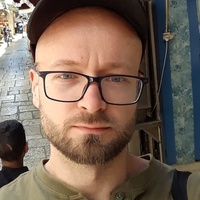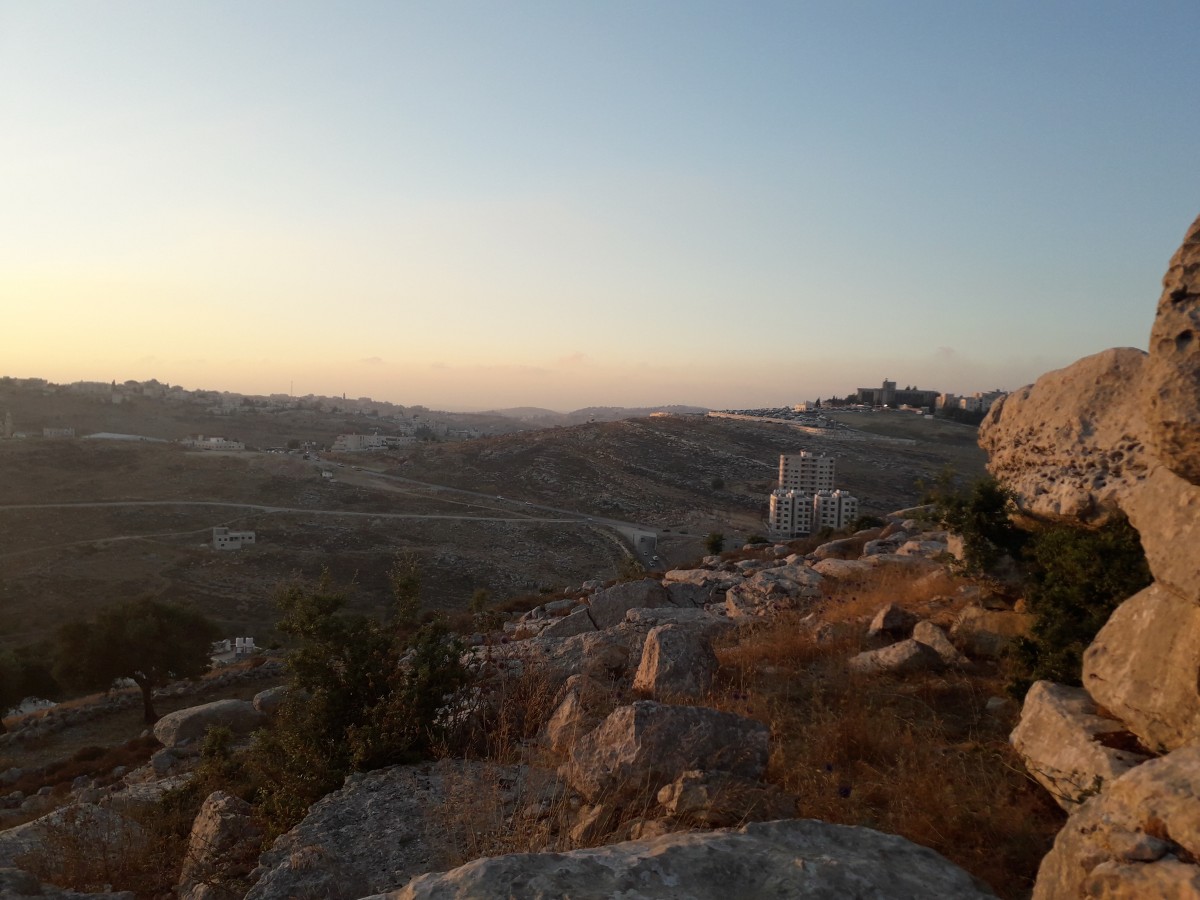
Lecturer
- About
-
- Office Address
- School/Department
- School of Divinity, History, Philosophy & Art History
Biography
I joined the Divinity Department as a lecturer in Second Temple Judaism in September 2022. Prior to this I was a post-doctoral fellow under the supervision of Dr Eshbal Ratzon in the School of Jewish Studies and Archaeology at Tel Aviv University. At that time, I lived in a Palestinian village near Ramallah, where I was studying local Spoken Arabic dialects.
Even if the College of Interdisciplinary Individual Studies in Humanities and Social Sciences at the University of Warsaw is my Alma Mater, starting a lectureship in Aberdeen feels like a homecoming - it is at the University of Aberdeen that I did my PhD in divinity with Prof. Joachim Schaper as my Doktorvater (2013-2019), during which time I spent two years on the campus and four years in off-campus travels from Germany (Tübingen), France (Paris), Austria (Salzburg), Israel (Haifa, Jerusalem) to Turkey (Tur Abdin).

From Abu Qash / Tel Aviv to Aberdeen
It is Abu Qash, a Palestinian village in the vicinity of Ramallah, where I lived while doing my post-doctoral research at Tel Aviv University. Crossing the boundaries!
Qualifications
- PhD Divinity2019 - University of Aberdeen
PhD dissertation:
‘Biblioclasm and the Scriptures – An Investigation of the Phenomena’subject of research:
the impact of book burning on the textual history of the Jewish and Christian Bibles and the Quran in their oral and written manifestationssupervisor:
Prof. Joachim Schaper (University of Aberdeen)internal examiner:
Prof. Grant Macaskill (University of Aberdeen)external examiner:
Prof. Geoffrey Khan (University of Cambridge) - MA Classics within Interdisciplinary Individual Studies in Humanities and Social Sciences2011 - University of Warsaw
- BA Classics within Interdisciplinary Individual Studies in Humanities and Social Sciences2010 - University of Warsaw
- Research
-
Research Overview
My research concerns Second Temple Judaism. This can be interpreted in at least two ways.
Firstly, we are dealing here with manifestations of Judaism chronologically delimited by the existence of the Second Temple in Jerusalem. Of course, this approach does not ignore other contemporary temples such as those in Leontopolis and Elephantine, on Mt Gerazim, and possibly elsewhere. To the contrary, it correlates Temple alternatives with their Jerusalemite point of reference.
Secondly, we are dealing here with manifestations of the ‘Temple-centred’, that is, the ‘sacrifice-centred’ Judaism. For sure, this approach does not ignore the fundamental role of Scripture in Second Temple Judaism. To the contrary, it precisely correlates the Scriptures with their focal point. Thus, the Scriptural and yet ‘sacrifice-centred’ Judaism of the time is distinguished from its later ‘Scripture-centred’ interpretation, which was projected onto it during successive Islamic and Christian reformations, and which belongs to its subsequent history of reception. Bearing this in mind will have a significant impact on understanding the historical Jesus and nascent Christianity.
Thus, delimited by the Second Temple period, the Judaism centred on the second Beit HaMiqdash in Jerusalem is the subject of my research.
This ‘exegesis’ of the term ‘Second Temple Judaism’ is based on my experience of living more than five years among Jews, Christians, and Muslims of and in the Middle East. In addition to my European intellectual formation, being immersed in Judaism, Christianity, and Islam in their original habitats has been a formative experience for me as a biblical scholar, theologian, and Christian. It is the Middle East that these three interrelated traditions manifest themselves as religions of the Book and of Sacrifice.
In my investigation of Second Temple Judaism, I seriously take into account Jewish, Christian, and Muslim sources, as well as historical, linguistic, and cultural parallels, from Late Antiquity through the Umayyad and Abbasid periods up to the present day, since languages and cultures of modern speakers of Neo-Aramaic and Spoken Arabic dialects can teach us a great deal about antiquity. I am highly interested in ambitious PhD students joining me in this multifaceted exploration across historical, cultural, linguistic, and religious boundaries, which is both challenging and fascinating.
Research Areas
Accepting PhDs
I am currently accepting PhDs in Divinity.
Please get in touch if you would like to discuss your research ideas further.
Divinity
Accepting PhDsSupervision
PhD research proposals are particularly welcome on the following subjects:
- textual criticism of the Hebrew Bible and its versions (Greek, Latin, Syriac, Arabic),
- the First Book of Maccabees and its reception,
- sacrifice in Second Temple Judaism,
- Jewish traditions in the Christianity of Late Antiquity and early Islamic period,
- Palestinian Arabic dialects and culture as vehicles for understanding the Bible,
- application of machine learning to Semitic languages (for projects involving a computer scientist as a co-supervisor).
Supervisees
- REVEREND BISHOP GUIRGUIS
- Teaching
-
Teaching Responsibilities
Programme Coordination:
- Certifcate in Theology [14V819R1]
- Diploma in Theology [14V829R2]
- Bachelor of Theology non-Honours DL [08V82088]
- Bachelor of Theology with Honours DL [08V82070]
- Individual Subject Study in Divinity [12V80699]
Course Coordination:
2024/25:
- History and Religion(s) of Ancient Israel (on-campus & online)
- Old Testament: Mundane Mechanics and Heavenly Concepts (on-campus; with Prof. Joachim Schaper)
2023/24:
- Hebrew of the Bible 1 (online)
- Hebrew of the Bible 2 (online)
2022/23:
- History and Religion of Ancient Israel (online & on-campus)
Non-course Teaching Responsibilities
Talmud Reading Group (2022/23)
under the auspices of the Chair of Hebrew and Semitic Languages (Prof. Joachim Schaper)
The goal of this reading group is to introduce students and scholars of theology, history, and philosophy who do not have Jewish educational background to studying the Mishnah and Gemara. We follow the text of the Talmud in English translation. Even if we occasionally refer to Hebrew and Aramaic as well as to manuscripts, it is not a prerequisite that participants know the Mishnaic Hebrew, Jewish Babylonian Aramaic, and Jewish Palestinian Aramaic, or have skills in Talmudic textual criticism.
Our weekly hybrid meetings are moderated from the campus by Dr Jakub Zbrzezny and remotely led by Dr Hillel Gershuni, a young Talmudic scholar, whose eight years at the Torat Hachayim Yeshiva were followed by twelve years in the Talmud and Halacha Department at the Hebrew University of Jerusalem. Dr Gershuni currently works on the digital critical edition of the Talmud Yerushalmi, an Israel Science Foundation’s project, hosted by the Department of Jewish History & Bible at Haifa University.
First half-session:
16 Nov., 23 Nov., 30 Nov., 7 Dec., 14 Dec. 2022
Second half-session:
15 Feb., 22 Feb., 1 Mar., 8 Mar., 15 Mar., 22 Mar., 29 Mar., 19 April, 26 April, 3 May, 10 May, 17 May 2023
Scholarly Voices of the Middle East (2022/23)
under the auspices of the Chair of Hebrew and Semitic Languages (Prof. Joachim Schaper)
This initiative aims at popularizing biblical scholarship from outside Western academia, focusing on research conducted by ancient and modern scholars based in or originating from what is called the Middle East in the anglophone world today. This aim is realised by means of popular lectures given by invited speakers whose field of expertise includes the history of ancient Middle Eastern biblical scholarship or who themselves represent Middle Eastern scholars of Biblical Studies and related fields.
Moderated by Dr Jakub Zbrzezny, the lectures are delivered in a hybrid mode, with on-campus participants meeting on the campus, and online participants joining through MS Teams. The lectures are open to all members of the UoA community.
Guest speakers:
- Dr Joe Uziel (28 Sept. 2022)
- Prof. Ishay Rosen-Zvi (5 Oct. 2022)
- Prof. Geoffrey Khan (12 Oct. 2022)
- Prof. Menachem Katz & Dr Hillel Gershuni (19 Oct. 2022)
- Prof. Menachem Fisch (26 Oct. 2022)
- Prof. Jonathan Ben-Dov (2 Nov. 2022)
- Dr Eshbal Ratzon (9 Nov. 2022)
- Publications
-
Page 1 of 1 Results 1 to 4 of 4
A computational analysis of the special Talmudic Tractates
Journal of Jewish Studies, vol. 75, no. 1, pp. 1-27Contributions to Journals: ArticlesBiblioclasm and the Scriptures: An Investigation of the Phenomena
Vandenhoeck & Ruprecht. 400 pagesBooks and Reports: BooksLiber Orationum Psalmographus: Nieobecne Dzieło Reformy Soborowej
Warszawskie Studia Teologiczne, vol. 23, no. 2, pp. 169-180Contributions to Journals: ArticlesLitania do Najświętszej Maryi Panny przyjęta przez Zakon Kaznodziejów
Prace Filologiczne, vol. 52, pp. 301-338Contributions to Journals: Articles
